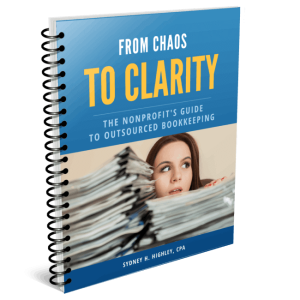
What You Need to Know About Nonprofit Compliance in 99 Words
Nonprofit compliance can feel overwhelming, but keeping your organization on track and protecting your mission is essential. From maintaining tax-exempt status to filing the correct paperwork, there’s a lot to manage. However, with the expert guidance of accounting services, you can ensure your financial reports are accurate, meet IRS requirements, and stay in good standing with regulatory bodies. The partnership provides relief, allowing you to focus on making a more significant impact.
Want more? Keep reading…
Table of Contents
ToggleUnderstanding Legal & Tax Nonprofit Compliance
This section will discuss the essentials of legal and tax compliance for your nonprofit, covering everything from maintaining 501(c)(3) status to meeting IRS and state requirements.
Why Maintaining 501(c)(3) Status Matters
Maintaining your nonprofit’s 501(c)(3) status is crucial for the following reasons:
- Tax Exemptions – 501(c)(3) organizations are exempt from federal income tax, allowing them to allocate more resources toward their mission and programs.
- Donor Incentives – Donations to 501(c)(3) nonprofits are tax-deductible, encouraging individuals and businesses to contribute more generously.
- Eligibility for Grants – Many government and private grants are only available to organizations with 501(c)(3) status, giving nonprofits access to critical funding sources.
IRS Regulations & Form 990
To stay compliant, nonprofits must follow IRS regulations, which include filing Form 990 annually. It provides transparency about finances, showing donors and the public that you manage funds responsibly. Missing deadlines or filing incorrect forms can lead to penalties.
State-Specific Compliance
In addition to federal requirements, nonprofit compliance with state laws that vary significantly across the country. These laws often govern charitable solicitation, financial reporting, and tax exemptions, making it crucial for nonprofits to understand their state’s regulations.
For example, Nonprofits in California must file an annual Statement of Information with the Secretary of State, in addition to submitting annual financial reports to the Attorney General’s Registry of Charitable Trusts. Failure to comply can result in penalties or loss of state tax-exempt status, impacting the organization’s ability to operate.
Meanwhile, in New York, nonprofits are required to file an annual CHAR500 form with the state’s Charities Bureau, detailing financial activities and governance structure. Additionally, nonprofits with gross revenues exceeding $1 million must have an independent certified audit. This transparency ensures the integrity of charitable organizations in the state and maintains public trust.
Texas also mandates that nonprofits register for charitable solicitation if they solicit donations within the state, and they must adhere to regular reporting requirements to maintain their exemption status.
Governance & Ethical Standards for Nonprofit Compliance
We’ll explore how strong governance and ethical standards can keep your nonprofit accountable, covering the board’s role in compliance, transparency, and fostering integrity.
The Board’s Role in Nonprofit Compliance
The board of directors is critical in ensuring your nonprofit remains compliant and operates ethically. They are responsible for setting policies, overseeing financial activities, and ensuring your organization follows legal guidelines.
A strong, engaged board helps prevent issues before they arise.
Conflict of Interest & Transparency
Implementing conflict-of-interest policies is essential to ensure decisions are made in the best interest of the nonprofit, not personal gain. Transparency fosters trust with donors and the community, especially with financial reports.
Clear, honest communication about how funds are used strengthens credibility.
Whistleblower Policies & Accountability
Whistleblower policies and internal audits help promote accountability within your organization. You create a safer and more responsible environment by encouraging staff and volunteers to report unethical behavior without fear of retaliation.
Professional accounting services can assist your nonprofit in setting up these policies, conducting audits, and ensuring financial transparency, enabling your board to focus on governance while upholding strong ethical standards.
Financial Reporting & Accountability
Let’s explore how accurate financial reporting and strong internal controls are essential for your nonprofit’s success and how partnering with accounting professionals can help keep everything on track.
The Importance of Accurate Financial Reporting
Accurate financial reporting is crucial for nonprofit compliance and for these benefits:
- Ensures Transparency – Accurate financial reporting provides a clear view of your nonprofit’s financial activities, building trust with stakeholders, including donors, board members, and the public.
- IRS Compliance – Meeting IRS requirements is critical to maintaining your nonprofit’s 501(c)(3) status and accurate reporting helps avoid penalties or audits.
- Builds Donor Confidence – Donors are more likely to contribute when they see that funds are managed responsibly and allocated toward the intended mission.
- Strengthens Financial Integrity – Precise reporting reduces the risk of errors or fraud, ensuring your organization’s long-term financial health.
Preventing Fraud & Mismanagement
Strong internal controls are essential to prevent fraud and mismanagement. These controls include regular checks, secure record-keeping, and clear approval processes. They help safeguard your organization’s resources and maintain financial integrity.
The Value of Outsourced Accounting Services
Working with outsourced accounting services can simplify compliance with financial regulations and Generally Accepted Accounting Principles (GAAP). These experts ensure your reports are accurate and timely so you can confidently focus on your mission, knowing your finances are in good hands.
Final Thoughts
Nonprofit compliance is vital for your organization’s success and longevity. From accurate financial reporting to strong governance, the proper practices keep your organization accountable and protect its mission. Outsourced accounting services ensure everything runs smoothly, allowing you to focus on making a difference.
Contact Daily Balance today to support your nonprofit’s compliance needs.
Nonprofit Resources

About the Author
Syd Highley is a CPA and Managing Principal of Daily Balance, a nonprofit accounting firm located in Sacramento, CA. Offering virtual nonprofit bookkeeping services that take the place of an in-house accounting department, with the added benefits of financial audit representation and virtual CFO services, Highley empowers nonprofits to focus on their missions while saving up to 40% in accounting costs.






